Thursday Feb 12, 2026
Thursday Feb 12, 2026
Friday, 21 December 2018 00:00 - - {{hitsCtrl.values.hits}}
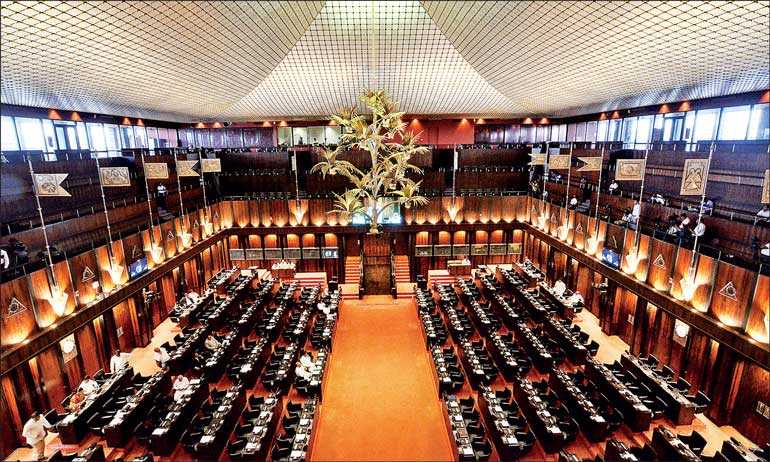
Although the political group that deserved the ruling power has been reinstated on account of the lawful and bold judgment given by the Judiciary, it will not act as a deterrent in preventing the collapse and the decadence of the State. The malicious alienation between the President and the Prime Minister will invariably deepen. The ensuing conflicts will add fuel to fire expediting the degenerating process of the state into a complete collapse. 
Parallel to the collapse of the State of Sri Lanka, a similar collapse can be seen in the Constitution as well, the supreme law of the country that determines and regulates the structure and the functioning of the State. Due to continuous and haphazard amendments, it has been rendered a frail and disorganised statute deprived of consistency and proper order that a constitution of a country ought to have.
If we want a stable State, before all else, we ought to formulate a proper constitution. It is not the proposed 20th Amendment that the Janatha Vimukthi Peramuna is supposed to bring in or the Constitution that Prime Minister Ranil Wickremesinghe was drafting. It should be a people’s constitution drafted by the people and capable of effecting a profound and desirable structural change in the entire system.
Sri Lanka does not have a proud history in constitution making. It has only a shameful history in constitutional affairs. Normally, nations make constitutions for long-term existence, not for short terms. The British Rule of Law, which is without a written constitution, is 750 years old. The American Constitution is 229 years old. No matter how old they are, the British do not bother their system of Government or Americans their Constitution. There have been three Constitutions adopted by Sri Lanka within 70 years since independence. The present Constitution can be said to be on its deathbed, requiring a forth one to be adopted.
Shameful history
The three Constitutions adopted so far by Sri Lanka can be regarded as constitutions formulated without following the principles, traditions, and standards that should be followed in constitution making. Not respecting the Constitution and violation of it were ugly features inherent to Sri Lanka.
The first draft of the Constitution which formed the basis of the Soulbury Constitution was compiled by Sir Ivor Jennings on the advice of D.S. Senanayake, the first Prime Minister of Sri Lanka. It was based on the original draft formulated by the Board of Ministers headed by D.S. Senanayake, without consulting at least the leaders of community groups. Subsequently, the Draft Bill, compiled by Sir Ivor Jennings was fine-tuned by B.P. Peiris, the Assistant Legal Draftsman, and was sent to Whitehall Authority for approval.
But the British Government did not accept the draft prepared by the Board of Ministers as the minority ethnic leaders in Sri Lanka had complained that they were not consulted and their legitimate demands were not taken into account in formulating the draft. Consequently, the Soulbury Commission was sent to Sri Lanka to recommend an appropriate system of government. 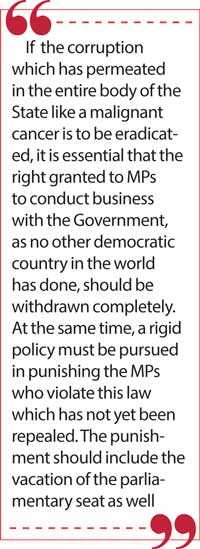
D.S. Senanayake, the Board of Ministers and the Ceylon National Congress were displeased over the rejection of the draft they had submitted and appointing of a new commission by the British Government. They all decided to boycott the commission as an expression of their protest.
However, Oliver Goonetilleke pointed out to D.S. Senanayake the importance of having dealings, at least behind the scenes, with the Commission while publicly boycotting it. This merely meant that they did not appear before the commission in public or “official” sittings while Senanayake and his associates held private meetings with the commission.
It was Oliver Goonetilleke who played the guiding role in this regard. Sir John Kotelawala was the other person involved in this back door deal. Oliver Goonetilleke’s involvement went so far that he succeeded in making the Secretary of the commission his girlfriend. This enabled him to develop a situation in which he was able to make the commission dance according to his tune. In fact, Oliver Goonetilleke became an “unofficial secretary” to the commission and significantly influenced it.
Soon after the military coup in 1962, Oliver Goonetilleke was removed from the post of Governor General and he left the country and lived in London. During his self-imposed exile in London, Oliver Goonetilleke married Phyllis Miller, the Secretary to the Soulbury Commission, whom he had befriended during the period of the Commission.
An interview Oliver Goonetilleke had given in London and another interview held by Neville Jayaweera with Sir John Kotelawala in London after 1970 gives a fair idea about the true nature of the backdoor dealings Oliver Goonetilleke and D.S. Senanayake had with the commission as well as the contribution Oliver Goonetilleke had made for the independence movement of Sri Lanka.
Interestingly, the members of the commission remained the guests of honour of D.S. Senanayake throughout their stay in Sri Lanka. He ensured a good time for them at his own cost. His intention was to have the draft formulated by the Board of Ministers adopted as the constitution of the country without any serious changes being made to the original document.
Sir John Kotalawale in a private banquet hosted by him for Lord Soulbury had explained to him the desire of D.S. Senanayake, and his willingness to offer the post of the Governor General in Sri Lanka to him, if he was prepared to oblige him with his request. Neville Jayaweera, in an article published in the Island newspaper, had commented that Lord Soulbury shook hands with Sir John Kotelawala agreeing to the proposal.
The first Republican Constitution drafted by the United Front Government in 1972, after 25 years of the Soulbury Constitution, was also formulated with the two-thirds majority of the Government, ignoring the claims of minority groups and without any agreement with the opposition parties.
The Federal Party submitted a document containing nine points to the Constituent Assembly. It was not even taken for discussion. As a result, the Federal Party boycotted the Constituent Assembly. Section 29 of the Soulbury Constitution which safeguarded the rights of the minority groups was removed without introducing alternate provisions for the protection of minority groups and their basic rights.
The provisions in the Sinhala Official Language Act which the Tamils had strongly objected were also enshrined in the Constitution. The 1972 Constitution can be considered as a constitution that had been strongly objected by the Tamil leaders and had pushed them into claiming for a separate state.
Six years later, in 1977, the then UNP Government adopted the third Constitution of the country. That too, was not a constitution adopted with the consensus of the Opposition parties. It was passed by the five-sixth majority commanded by the UNP Government in Parliament. By that time, a number of Tamil political parties had joined up and the Tamil United Liberation Front had been formed, which was the main Opposition party in Parliament. However, they were not involved in the constitution-making process, and nor did they seemed to have evinced interest in joining it.
Violation of the Constitution
President Maithripala Sirisena is not the only executive who has violated the Constitution. Sri Lanka has set a world record in violating the Constitution of the country. The Executive, Legislature and Judiciary have violated it in many instances, individually and collectively. 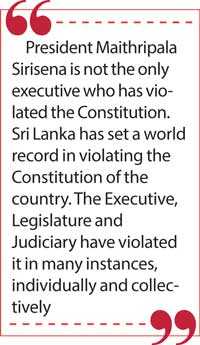
The ink on the Soulbury Constitution was barely dry when D.S. Senanayake, the first Prime Minister of Sri Lanka, breached it by adopting two Acts of Parliament, depriving the citizenship rights of Indian plantation workers.
The issue of the Indian plantation workers should have been resolved soon after independence. A section of plantation workers who had lived a long period in the country desired to become citizens in Sri Lanka. But, the rules and regulations implemented in this regard had been designed in such a manner that they could not become the citizens of Sri Lanka.
D.S. Senanayake regarded the leftist Lanka Samasamaja Party (LSSP) as his main rival and was angry over the Indian plantation workers as they opted to support the leftist candidates at the constituencies which were not contested by the Congress of the Plantation Workers at the general election. His anger was further exacerbated when the Members of Parliament elected from the plantation sector refused to support him in forming a government. Thus, in addition to teaching a lesson to the plantation workers, he tried to weaken the LSSP.
The Sinhala Only Act, formally the Official Language Act introduced by Bandaranaike, can also be considered a move against the Constitution. According to this law, it became a necessary condition for Tamil public servants to pass a Sinhala proficiency test to safeguard their jobs and be qualified for their increments.
A clerk named Kodeswaram, who was deprived of his salary increments, filed a case in the Court arguing that the Sinhala Official Language Act was contrary to the Soulbury Constitution. The Court accepted the argument and passed the judgment in his favour, but the Attorney General appealed against the judgment and the Court of Appeal annulled the decision of the Judiciary.
After that, the Federal Party submitted an appeal against the verdict of the Court of Appeal to the Privy Council. Although the Privy Council has given a ruling in favour of Kodeswaram, the Government did not take steps to change the language policy that led to the oppression of the Tamil people.
Seven of the 19 amendments so far made to the 1978 Constitution can be described to be in violation of the Constitution. Of these, the legendary Fourth Amendment which empowered the UNP Government which had a five-sixths majority in the Parliament, to extend its term of office for another five years by a referendum, led to distort the political course of the country completely, and push the country into violence.
The judgments given by the Supreme Court during the reign of Chandrika Kumaratunga, safeguarding the parliamentary seats of the Opposition MPs who joined the Government can be considered as rulings which led to the violation of the Constitution. The anti-constitutional tradition established by the Judiciary with these rulings has weakened the entire system of government. 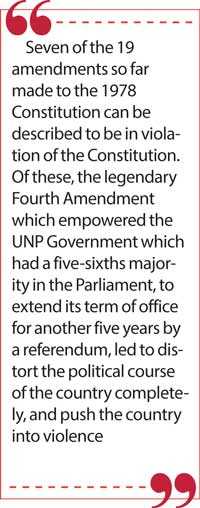
The arbitrary practice adopted by Parliament during the Rajapaksa regime in regard to the removal of Shirani Bandaranayke, the 43rd Chief Justice of Sri Lanka, irrespective of Court orders has been another instance of serious violation of the Constitution.
Hence, it is wrong to treat Maithripala Sirisena as the first Head of State to violate the Constitution. This clearly shows that the Prime Ministers too had violated the Constitution when the country had the parliamentary system of government. Similarly, when it was changed to a presidential system, this practice had been carried through in several instances, not only by the Presidents but also by the Legislature and the Judiciary as well.
Thus, the present constitutional crisis and the aggravation of the decline of the State can be considered an inalienable retribution of the great sins that had been committed in the sphere of violation of Constitutions so far.
Adopting a new constitution
In view of the present unfortunate situation of the State and the Constitution, Sri Lanka must give top priority, above everything else, on the need for adopting a new constitution for the country. We should think seriously and initiate a live dialogue about it.
Until the present constitutional crisis came up, most of the people, not only the general public, but even those who aspired to contest for the forthcoming presidential election like Gotabaya, Pallewatte and Nagananda did not know that after the 19th Amendment the position of the president has been brought down to a level of a nominal head deprived of most of the executive powers previously held by the President prior to the 19th Amendment. All of them spoke a lot about how to build the country and what they would do if they were elected to the post of the president.
I initiated a public debate on the subject ‘How could a president whose executive powers have been removed drastically following the 19th Amendment build the country?’ It was in this backdrop that the incumbent President removed Ranil Wickremesinghe’s Government, giving power to Mahinda Rajapaksa.
The Legislature and the legislative institutions of the country were in a state of complete bankruptcy in regard to the subject knowledge on the Constitution and the formulation of a Constitution. The enactment of the 19th Amendment and the Local Government Election Law were two important instances that exhibited the extent of inefficiency and the bankruptcy of the Parliament and the Attorney General’s Department in regard to law making.
Formulation and adoption of a new constitution is now an important prerequisite for country’s forward march. But, the constitution that the country needs today is not the one that Ranil Wickremesinghe had in mind. Both Ranil Wickremesinghe and Jayampathy Wickremaratne, by enacting the 19th Amendment, have clearly proved their lack of experience and the discipline necessary to formulate a wholesome constitution. They only wanted to abolish the presidential system and give the power to Parliament.
The constitution they have been making does not have a far-reaching vision of eliminating the lethargy, corruption and sadism that has permeated and overwhelmed the Parliament as well as the entire institutional system.
If the corruption which has permeated in the entire body of the State like a malignant cancer is to be eradicated, it is essential that the right granted to MPs to conduct business with the Government, as no other democratic country in the world has done, should be withdrawn completely. At the same time, a rigid policy must be pursued in punishing the MPs who violate this law which has not yet been repealed. The punishment should include the vacation of the parliamentary seat as well. 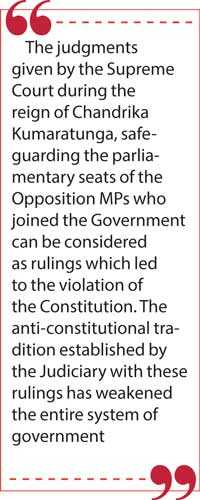
Also, new arrangements for preventing corruption must be introduced and institutions for that must be established. There was no such vision in the constitution drafted by Ranil Wickremesinghe and Jayampathy Wickramaratne. On the other hand, the decay and the collapse of the State can be overcome only through a deep and far-reaching structural change capable of effecting a complete transformation in the entire State, its institutions and the social system and not by a simple and superficial change.
In view of the gravity of the ongoing crisis in Sri Lanka, at this historic moment, the country demands a people’s constitution, that enhances the supremacy of the people, to be formulated by the people and in collaboration with the people’s representatives in the legislature and not a selfish constitution adopted under the supremacy of the corrupt parliamentarians who lack wisdom and had lost their integrity and public confidence.
It should be a constitution that would not allow corruption, waste, lethargy and sadism; it should ensure the rule of law and introduce methodologies and structures that allow the people also to participate directly in the governance process in addition to the rule by the people’s representatives. Thus, the new constitution should be conducive to building a modern people’s state. It should also be a constitution based on the lessons learnt from the serious mistakes and offences committed in the past.
Thirdly, it should be a constitution that paves the way for creating a modern state by integrating the divided society ensuring equal respect and equal rights for everyone regardless of ethnic, caste and religious differences.
Finally, it must be a constitution that would cause a desirable, effective and profound change in the lives of all, including the mass media, education, health, transportation, industry, agriculture, trade, energy, environment and especially the poor peasants.
Is there a possibility for a powerful people’s organisation having public support that exceeds the popular support enjoyed by political parties, to formulate a new constitution through a program which exercises the people’s sovereignty peacefully, sensibly and creatively? Is there a provision in the Law and the international law for such a program? I hope to discuss this issue in the next article.